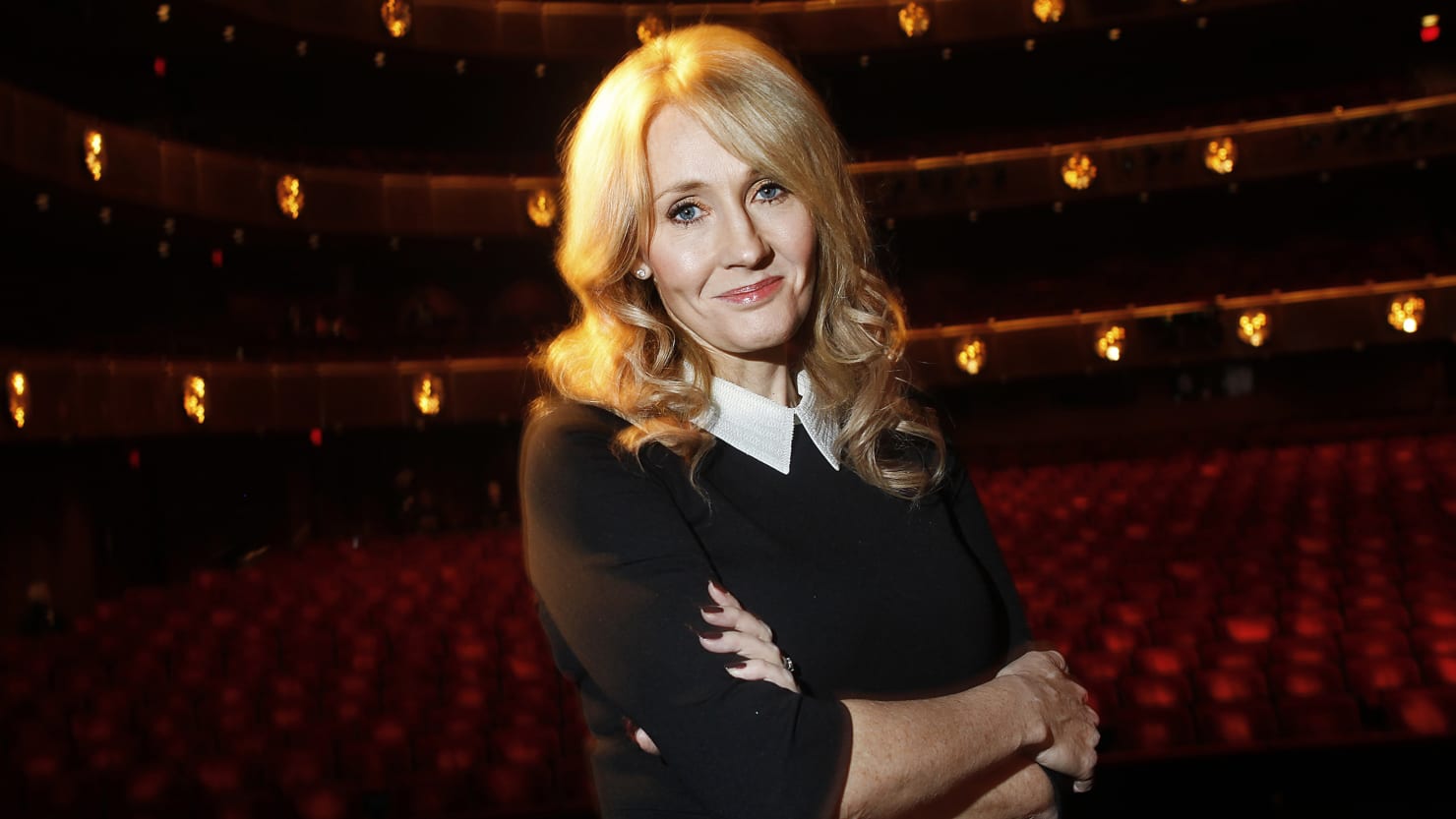J.K. Rowling is not worried about what her anti-trans speech might do to her legacy. In fact, while speaking on the new podcast The Witch Trials of J.K. Rowling, the Harry Potter author said that while she “never set out to upset anyone,” those who assume she cares about tarnishing her reputation “could not have misunderstood me more profoundly.”
“I do not walk around my house thinking about my legacy,” Rowling said on the podcast, which debuted its first two episodes on Tuesday. “Whatever, I’ll be dead. I care about now. I care about the living.”
In various tweets and manifestos over the past few years, Rowling has framed transgender women as a covert threat to cisgender women and spread widely debunked “concerns” about trans people’s identities and behavior. A healthy contingent of fans and even former colleagues, including the Boy Who Lived himself, Daniel Radcliffe, have since distanced themselves from her. The Witch Trials of J.K. Rowling—from columnist Bari Weiss’ fledgling media company The Free Press—attempts to turn this fiasco into just part of an ongoing narrative in which the author’s detractors try to silence her. There were the fundamentalist Christians who rallied against Harry Potter during its heyday in the late ’90s, and now, the podcast posits, a vocal set of fans (and some entertainment industry professionals) have similarly renounced the author after years of anti-trans statements. Surely these are the same!
The timing of The Witch Trials of J.K. Rowling’s release is conspicuous. Last week, hundreds of New York Times contributors signed a letter urging the paper to improve its coverage of trans people. A day later, the Times published an opinion piece from columnist Pamela Paul titled “In Defense of J.K. Rowling,” in which she argued that it “is as dangerous as it is absurd” to call Rowling transphobic. All of this, of course, is happening while conservative lawmakers in states like Florida continue their work to roll back every possible protection for trans people.
Now, we have this podcast: an exercise in false comparisons and warped power dynamics that, as one might expect given its title, is also full of dog whistles. Not only do the first two episodes liken the fundamentalist Christian anger organized against Potter in the ’90s to the more recent controversy that’s erupted around Rowling’s anti-trans comments, but they also feature an astounding amount of ancillary information designed, presumably, to act as “context” for the author’s remarks. At no point (so far) does the podcast meaningfully engage with the very real, steadily increasing violence that’s being perpetrated against trans people.
“At no point (so far) does the podcast meaningfully engage with the very real, steadily increasing violence that’s being perpetrated against trans people.”
The podcast’s host, Megan Phelps-Roper, is a reformed spokeswoman for the Westboro Baptist Church, famous for its slogan “God hates f**s.” (As the political activist discussed in a 2019 NPR interview, she began to question the group’s extremist teachings after she operated its Twitter account and read some of the arguments being made against them; she ultimately left the group.) Phelps-Roper notes that as she was growing up, extremist Christians were pushing to burn Rowling’s books; now, she says, some trans people and their advocates are doing the same in response to Rowling’s tweets about gender.
“One of the things that stood out to me,” Phelps-Roper says in the first episode, “was how people on all sides of this conflict felt so under attack, so threatened, that they invoked the language of witch hunts even as they vehemently disagreed about who was the witch and who was the mob lighting the fire.” And yet, the title The Witch Trials of J.K. Rowling does seem to indicate that someone has drawn a conclusion.
In its first episode, the podcast relays Rowling’s biography as a single mother who rose to unexpected fame with a children’s book series no publisher expected to become a hit. Rowling also repeats her allegation of domestic abuse against her daughter’s father and notes that her increased fame and the subsequent evaporation of her privacy made her fearful for her safety. In Episode 2, we pivot to a needless recap of the entire 1990s, when the Potter series became a phenomenon—from the booming economy, to the L.A. Riots, to Marilyn Manson getting blamed for the Columbine shooting, to the battle over gay rights. Through most of this, listeners might find themselves wondering, “What does any of this have to do with what J.K. Rowling has said about trans people?”
Do we really need to understand how good or bad the economy was in the ’90s, or why kids love books about magic, to discuss the comments she’s made? Does the existence of Harry Potter fans who cannot see Severus Snape as anything but a villain mean that everyone who’s spoken out about Rowling in the wake of those comments must be inherently misguided? The answer to all of these questions might be a resounding “of course not,” but The Witch Trials of J.K. Rowling seems to hope it can filibuster those questions from our minds with additional “context.”
In fact, most of this information feels more like an ancillary distraction from the point: Rowling has repeatedly advocated against policies designed to help trans people, who are being increasingly attacked and murdered. This is not a “constant assumption of persecution,” as an ex-fundamentalist Christian described his own beliefs to Phelps-Roper. Last fall, the nonprofit Everytown for Gun Safety reported that murders of trans people nearly doubled between 2017 and 2021, rising to 56 reported murders.
At least one source who participated in The Witch Trials of J.K. Rowling has already spoken out against it: YouTuber Natalie Wynn, known on YouTube as ContraPoints, responded to news of the podcast’s impending release last week with a Twitter thread in which she called her participation “a serious lapse in judgment.” Wynn went on to describe her conversation with Phelps-Roper as a “pretty miserable three-hour interrogation about my own transition, as well as the usual ‘concerns’ about trans rights” and said she regrets her participation.
“Megan does not seem to grasp that trans people are fighting for our lives, our right to exist in society,” Wynn wrote. “And that this fight is in no way equivalent to the rationalizations offered up by people who oppose trans rights, even when the former are angry and the latter composed.”



